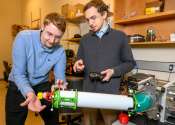Exposure to soft robots decreases human fears about working with them
Seeing robots made with soft, flexible parts in action appears to lower people's anxiety about working with them or even being replaced by them.
Dec 5, 2023
0
83
Robotics

Seeing robots made with soft, flexible parts in action appears to lower people's anxiety about working with them or even being replaced by them.
Dec 5, 2023
0
83
Robotics

Recently published research assessed human trust when collaborating with eyed and non-eyed robots of the same type. The data suggest that humans might not need human-like machines to trust and work with them. Instead, they ...
Sep 5, 2023
0
91
Electronics & Semiconductors

Imagine a thin, digital display so flexible that you can wrap it around your wrist, fold it in any direction, or curve it over your car's steering wheel. Researchers at the Pritzker School of Molecular Engineering (PME) at ...
Apr 13, 2023
0
90
Electronics & Semiconductors

Scientists at the University of Sussex have successfully trialed new biodegradable health sensors that could change the way we experience personal health care and fitness monitoring technology.
Mar 2, 2023
0
56
Consumer & Gadgets

Pet and animal-related apps are creating cybersecurity risks to their owners, new research has shown.
Feb 27, 2023
0
112
Computer Sciences

Could an app tell if a first date is just not that into you? Engineers at the University of Cincinnati say the technology might not be far off. They trained a computer—using data from wearable technology that measures respiration, ...
Feb 13, 2023
0
21
Engineering

Testing time perception in an unusually lifelike setting—a virtual reality ride on a New York City subway train—an interdisciplinary Cornell research team found that crowding makes time seem to pass more slowly.
Nov 29, 2022
0
38
Electronics & Semiconductors

Many flexible fitness trackers can't be submerged in water because the coatings required to completely seal these devices would make them uncomfortable to wear. Now, researchers reporting in ACS Nano have applied a thin, ...
Oct 7, 2022
0
82
Engineering

Imperial researchers have embedded new low-cost sensors that monitor breathing, heart rate, and ammonia into t-shirts and face masks.
Sep 23, 2022
0
34
Computer Sciences

Holographic teleportation sounds like something out of Star Wars or Star Trek, but instead of the bridge of a flashy interstellar spaceship, a world-first technological achievement took place in a nondescript boardroom on ...
Aug 4, 2022
0
545